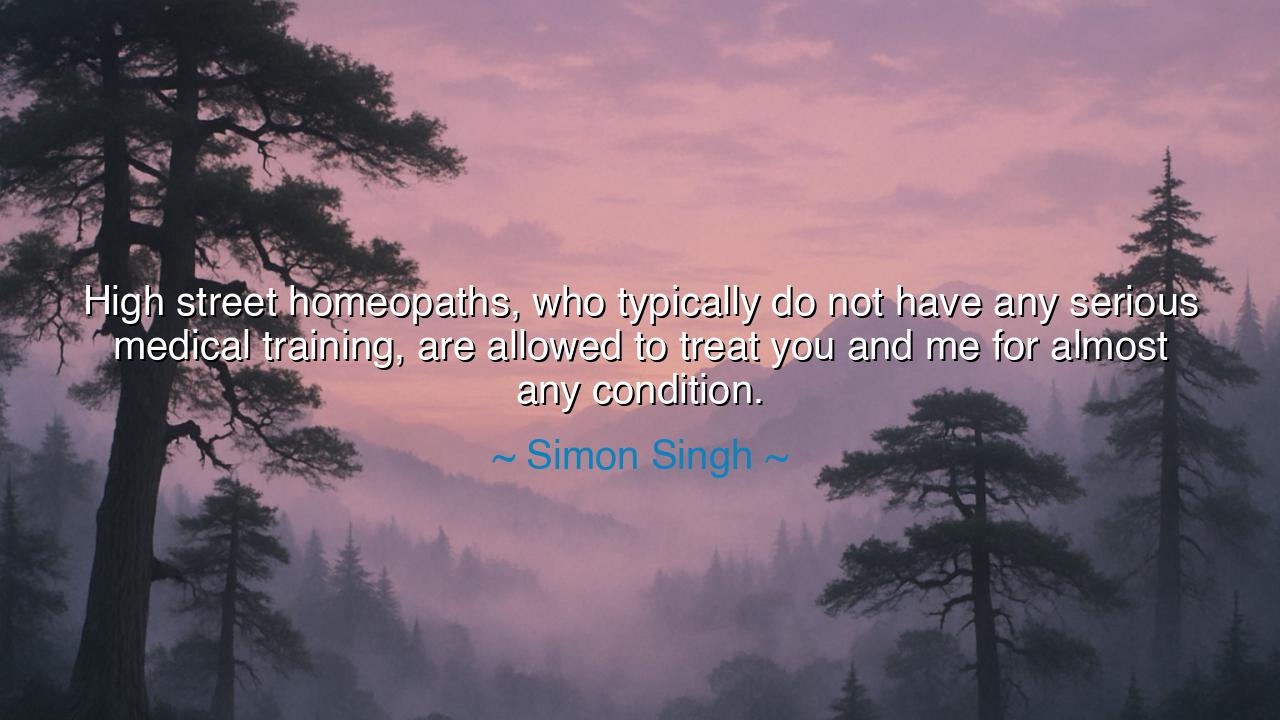
High street homeopaths, who typically do not have any serious
High street homeopaths, who typically do not have any serious medical training, are allowed to treat you and me for almost any condition.






“High street homeopaths, who typically do not have any serious medical training, are allowed to treat you and me for almost any condition.”
Thus spoke Simon Singh, a man of science and reason, who has dedicated his voice to the defense of truth against the comforting illusions of false knowledge. His words are not spoken with cruelty, but with the sorrow of one who has seen wisdom traded for wishful thinking. In this quote, Singh casts light upon the perilous divide between belief and evidence, between hope and harm. He warns that when medicine—born of observation, testing, and discipline—is replaced by unproven claims, we risk turning our bodies and our souls into the battlegrounds of ignorance.
To understand his words, one must first know the world from which they arose. Homeopathy, that ancient-sounding practice born in the 18th century, claims that substances which cause symptoms in a healthy person can cure similar symptoms in the sick, when diluted beyond all measurable trace. To many, it offers simplicity and gentleness—a comforting alternative to the sometimes cold machinery of modern medicine. Yet Singh, armed with the torch of science, reminds us that comfort is not the same as cure, and that compassion without understanding can destroy as swiftly as cruelty. His critique is not of faith itself, but of the danger that comes when faith masquerades as fact.
In ancient times, the healers of Greece—those disciples of Hippocrates—knew that to treat illness was to walk a sacred path between nature and knowledge. They observed, recorded, and questioned endlessly. Their motto, “First, do no harm,” still guides physicians today. Singh’s lament arises from the betrayal of this ancient oath. For he sees a world where untrained practitioners, though perhaps well-meaning, are allowed to treat “almost any condition”—from fever to cancer, from grief to infection—without the burden of proof or the discipline of study. To him, this is not freedom, but folly; not healing, but hazard.
Consider the tale of Florence Nightingale, the great nurse of the Crimean War. She battled not only disease but superstition. At a time when illness was thought to be born of miasmas—evil airs—she gathered evidence, measured outcomes, and proved that hygiene and structure saved lives. Her wisdom, though simple, was revolutionary because it was tested. She taught the world that medicine must rest upon knowledge, not ritual. Singh’s warning walks in the same spirit: that healing divorced from reason becomes a shadow play of good intentions.
And yet, his words are not meant to scorn those who seek homeopathy, for he understands the yearning that drives them—the desire for gentle remedies, for attention and empathy, for a human connection that the modern world too often withholds. What he condemns is not the longing for care, but the false promise that replaces truth with illusion. When untrained healers step beyond their limits, claiming to cure what only science can treat, they trespass upon sacred ground. For in their hands, trust becomes a weapon against the very people it was meant to protect.
Singh’s challenge, therefore, is not merely to the healers of falsehood but to the guardians of truth. He calls upon society, upon its teachers, physicians, and lawmakers, to awaken—to demand that healing be guided not by superstition, but by knowledge tested and proven. For to allow deception to stand beside truth as its equal is to invite confusion, and confusion is the mother of suffering. His warning is a defense not of science alone, but of integrity, that most fragile and most essential virtue.
The lesson, then, is clear and timeless: seek truth in all things, and weigh belief against reason. The wise healer must possess not only compassion but also understanding, for kindness without knowledge is like a lantern without flame—it offers warmth for a moment, then leaves the traveler in darkness. Let us honor both the heart and the mind, for when they walk together, healing is born. But when they part, disaster follows.
So, my children of the future, remember Simon Singh’s call. Do not surrender your health to those who offer comfort without knowledge. Demand evidence, seek education, and trust not the smooth words of false healers but the humble rigor of those who question even themselves. For the body is a temple, and truth is its only medicine. The wise will remember that compassion guided by truth can heal the world—but compassion guided by ignorance can wound it beyond repair.






AAdministratorAdministrator
Welcome, honored guests. Please leave a comment, we will respond soon